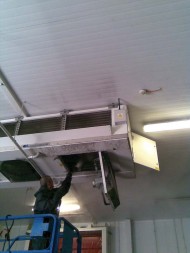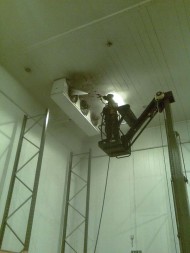An experiment to assess how improvement of air-flow through coolers/evaporators might reduce energy costs was carried out by Distribution Hygiene Services with the help and assistance of the Chief Engineer of Brakes Group, Ian Hunt.
Introduction:
As part of our cooler cleaning service that we offer to our clients we always take air-flow readings in metres per second both before and after a clean. These readings are collated into a graph and form part of our After Clean Report that is forwarded to our customers once the clean has been completed.
We found that we were regularly seeing improvements in excess of 40% and it seemed logical that any improvement in the air-flow must mean a more efficient refrigeration regime, and that this must result in energy savings.
Phase 1: Pre-Clean Energy Usage
 In the Brakes Grantham Distribution Centre, three coolers were clamped for a week before DHS came on site, and the amount of electricity used was monitored, together with the cost.
In the Brakes Grantham Distribution Centre, three coolers were clamped for a week before DHS came on site, and the amount of electricity used was monitored, together with the cost.
Phase 2: Air-flow results before and after clean.
Once DHS was on site it was immediately observed that the coolers chosen for this experiment were not very dirty (we regularly see much worse). Pre-clean air-flow readings were taken and then the coolers and their associated condensate lines were thoroughly cleaned with particular care taken to ensure that the coils, fins, and drip trays were immaculate. The subsequent post-clean air-flow readings reflected that these coolers had not been very dirty as the improved air-flow readings only amounted to 12% (we regularly record improvements in excess of 40%).
Phase 3: Post Clean Energy Usage
The three coolers were then clamped once more and readings recorded for the next week.
Phase 4:
From the readings illustrated above, it can be observed that a saving in cost of 21% or £1,400 per cooler for one week.
CONCLUSIONS:
 This experiment clearly shows that substantial energy savings can be brought about by the simple expedient of keeping cooler perfectly clean. If each cooler could be kept in the same immaculate condition the saving would have amounted to £1,400 p.a. This obviously is an impossible aim, but we are now recommending to all our clients that coolers are cleaned at least twice a year as the cost of cleaning simply pales into insignificance when measured against the savings.
This experiment clearly shows that substantial energy savings can be brought about by the simple expedient of keeping cooler perfectly clean. If each cooler could be kept in the same immaculate condition the saving would have amounted to £1,400 p.a. This obviously is an impossible aim, but we are now recommending to all our clients that coolers are cleaned at least twice a year as the cost of cleaning simply pales into insignificance when measured against the savings.
Distribution Hygiene Services Ltd
Tel: 01763 287267





Comments are closed.